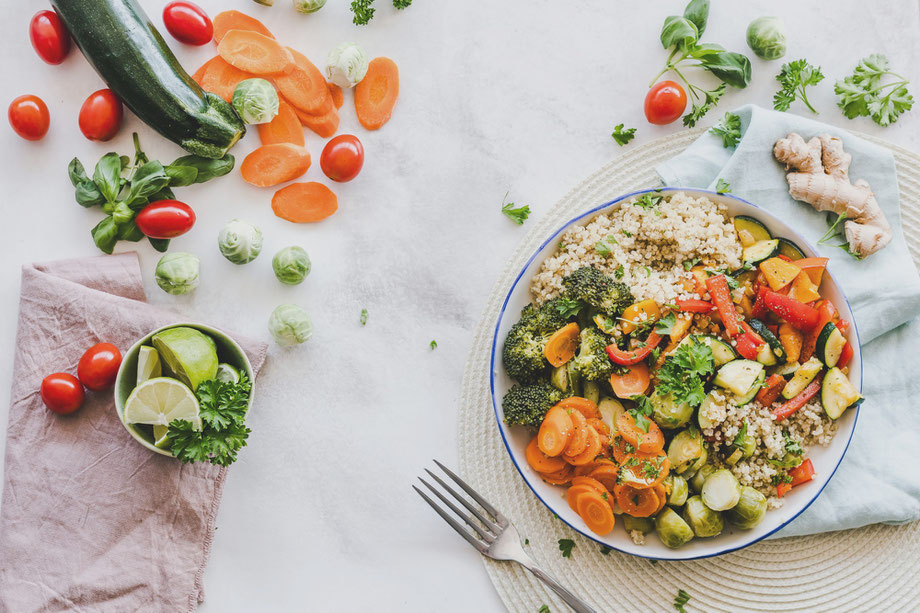
The article in short
Nutrition plays a huge role in how you feel and perform, along with recovery and movement. With tons of different diets and advice out there, it's hard to get started at all. Because nutrition and food is such a broad topic, it can’t be summarized into one form or the “perfect diet”. Our bodies are just too different. On top of that, different environmental factors and the degeneration of our planet are important factors in the nutrition equation. Depending on where you live, the nutrient content, even in water, might be varying a lot.
I’m still experimenting with the broad topic of nutrition but the one thing I know is that it is INDIVIDUAL. A different approach might be needed for each and every person. If you can, listen to your body. If you are like me and have partially lost the ability to know what your body wants and needs, try a test to figure out more about YOUR system (DNA, blood, intolerances). However there are some things that work well for almost anybody, which we want to explore in this article.
You will learn which steps you can take to better understand your individual requirements, what you should look out for apart from your genetic predisposition and why cooking yourself might greatly benefit your performance. Scroll down all the way to the end if you just want the quick list to optimize nutrition.
The overwhelming choice
There are so many different diets out there, it's hard to follow. Vegetarian, vegan, carnivore, gluten-free, low-carb, bulletproof, pescetarian, raw-vegan, fruitarian and many more. Usually the supporters of those diets claim that theirs is the one and only way to live a healthy life. Nowadays, each of these diets even seem to have a documentary, promoting its benefits while demonizing other kinds of diets. I think all of them are right. What? Continue reading.
Everybody is different. Starting with the genetic predisposition we all inherit from our ancestors, across certain developed allergies and food sensitivities, all the way to our upbringing and education around the topic of food. All those factors influence how we react to certain compounds, nutrients and types of diets. So why are we eager to believe that one diet is superior to all others, for each and everyone of us? I guess it has to do with our inherent wish for simplicity, rules and guidelines, to avoid complexity and decision fatigue.
In my opinion (which admittedly is based mostly on my own results and experience over several years) a balanced approach is the key to optimized nutrition. If in doubt, I often ask myself: “What did the nutrition of my ancestors look like?” or “How and what did my grandparents or great grandparents eat?”. Also interesting to see is what has been a proven staple food over decades, centuries or even millennia. If several generations of people thrived on a certain diet, it might not be that bad after all.
Last but not least there is the paradox of choice in our modern food industry. While supermarkets are filled with products, overwhelming us completely with different packaging and marketing, the amount of base ingredients is relatively limited. You will find that a lot of snacks and processed foods contain similar ingredients like corn, which is one of the cheapest fillers available. We are told that we can decide between high and low quality or healthy and unhealthy by purchasing brands. Truth is that only by buying actual food, meaning unprocessed natural products, will you get the most healthy and beneficial nutrients. To a certain degree, we have to educate ourselves and take responsibility for what we put on our tables.
HOW TO FIND OUT WHAT IS RIGHT FOR YOU?
Amidst so many opinions, dietary advice and nutrition cults, how can you find out what is good for YOU? While some argue that listening to your body is the way to go, it didn’t work for me. I had a slight suspicion but couldn’t feel that some products promote an immune reaction in my gut. Maybe I’ve lost the connection to my body but I was determined to figure out what was going on. That’s why I greatly support testing in the forms of DNA test, blood test and food intolerance tests. It provides you with insight on your genetic predisposition and the current status quo of your gut and blood.
It costs some money but saves a lot of time and energy, which I value even more at the moment. As a partner of Lykon, Minimalist Biohacker can support you with -15% on all their tests. You can follow this link to start testing and getting insight on your current situation (Germany, Austria and Switzerland only at the moment of writing).
The other option, which will save you money, is to observe, isolate and eliminate. A food journal will help you track your meals and how you felt afterwards. With more data, you will be able to find out which kinds of food lead to which feeling, slowly eliminating the kryptonite one by one. For me the investment in a proper test is superior to such tracking but it depends on your financial situation.
Baseline is: Without knowing what is good or bad for YOU, following any sort of diet is like gambling. It might be right but it doesn’t have to be. Oftentimes the effects are only visible after a longer period of time. Get educated about your own body and setup. It's a one-time investment which will benefit you for the rest of your life. It also pays to know exactly what your goals are, before diving into a certain diet. Would you like to lose or gain weight, build muscle, get more energy or achieve more mental clarity? All these goals will come with a slightly different approach to nutrition.
The following suggestions for optimized nutrition should not be mistaken as a rule for all, or as set in stone. New findings are coming in, further sharpening our understanding of what is good and healthy. However it seems to be valid for everyone, independent of genetic predisposition, intolerances or the environment. That’s why they form the BASICS, designed to support health, strength, cognitive performance and even longevity. Another perspective is scalability and sustainability. Just because it is optimal for one person, doesn’t necessarily mean it’s optimal for a large share of the human population. I would like to show a balanced way between optimization for ourselves AND our environment. Only if we improve both will we be able to properly enjoy our heightened performance.
Less meat, but better
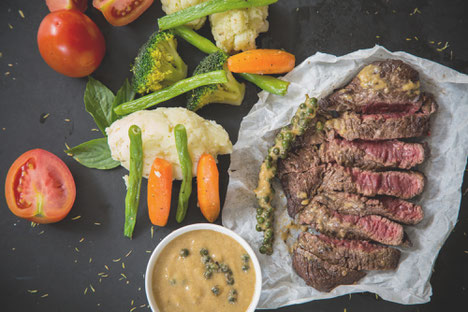
Yes, meat is important to naturally ingest important micro nutrients like vitamin B12, iron, saturated fat, amino acids and more, in their most bio-available form. That doesn’t mean we need meat every day or even with every meal (although the restaurant scene in my hometown might not approve of that statement).
More important than the quantity of meat is the quality. Think of an animal as the middle-men between the world of plants and us. A cow eats grass and digests it through several stomachs. We then eat the meat of the cow. So what did we just eat? Grass, light and water, all collected and condensed into a juicy slice of beef. The important take-away is that whatever the animal consumes, we consume. If the cow ate corn and antibiotics, we get corn and antibiotics in the form of meat. If it ate lots of grass and spent time outdoors, we get all the nutrients from there. Make your meat as healthy and high quality as possible (e.g. grass-fed and raised properly). It will provide better fuel for you and your body.
Another approach I take towards meat is to look at my great grandparents and grandparents. After World War 2, resources and food supplies were scarce. Meat was very expensive and therefore a luxury, meaning there would only be meat on the weekends. On other days it was either lots of vegetables or left-overs. I try to reduce my intake of meat to only a few days a week as well, looking out for proper quality and incorporating the parts which are usually left aside (e.g. liver, heart, kidneys, meat with lots of bones, etc.).
Get your meat if you like, but look out for LESS BUT BETTER.
Eat plant-based
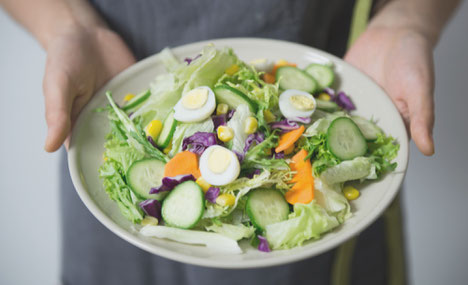
Vegetables provide important macro nutrients like protein, carbs and fats but also micro nutrients like vitamins, minerals, prebiotics, fiber and antioxidants. With depleted soils, containing less trace minerals and nutrients for the plants to grow, we need to consume a higher amount of vegetables to ingest the required levels for maximum performance. Alternatively we can make use of supplements or artificial nutrients but that is a different topic. Spurred by documentations like “Game Changers”, plant-based diets become more popular. While I do not see the benefits or necessity for a sole focus on plants, I definitely think we should eat much more vegetables. Basically the more, the better.
Integrating more vegetables into your diet will also prevent you from overeating on unhealthy food or robbing the snack bar.
Resource for further study on plant-based diets and my favorite vegan cook: [1], [2], [3], [4], [5]
Eliminate sugar
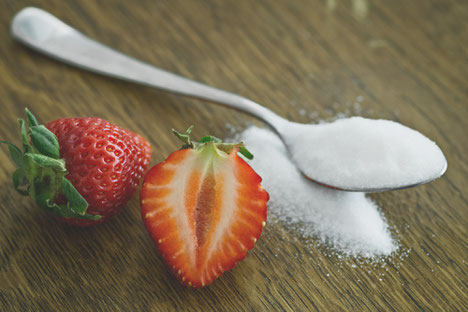
Before we had access to processed food, refined sugar and mass-grown crops, the average human ate around one tablespoon of sugar per year. Now it’s more like several kilograms. The way we eat is far from natural and most of us consume a lot more sugar than we should. But why is sugar seen as harmful?
Most forms of sugar found in nature consist of both glucose and fructose (e.g. fruits). Glucose is found in potatoes, rice, grains etc. and can be used as energy by almost each cell in your body. Especially our brain loves glucose as fuel. The fructose part however is not used as fuel but rather stored as fat. That might be a very practical mechanism to store fat for the cold winter period, by eating lots of ripe fruit at the end of summer. In addition, the body receives signals which prepare it for a longer period of fasting - “we have to store and save in order to survive”. Especially sugary drinks and fruit juices are harmful because they bypass the gut lining quickly and are stored immediately. Because the brain can’t extract enough glucose from sugary drinks to create energy, it craves more and more. That is the well-known blood sugar drop along with the cravings, which you might experience throughout the day if you consume a lot of sugar.
The liver transforms the amounts of sugar, which are not needed for energy production, into fat. To dispense the fat throughout the body, “transport wagons” are needed. Those transport vehicles (LDL - low density lipoprotein) form a triglyceride, the combination of glucose, fat and cholesterol. So high amounts of fructose lead to a high amount of triglycerides, which might lead to clogged arteries. That’s why it's bad when your LDL cortisol levels are high. It means lots of glucose and fat is distributed throughout the body, but not transported back out. On the contrary, high HDL (high density lipoprotein) cholesterol levels are good, because it means there are a lot of transport vehicles to clean everything out again.
So high levels of fructose might pose a big risk for cardiovascular illness. On top, a constant supply of sugar reduces your bodies sensitivity to insulin. Insulin is a hormone produced in the pancreas, responsible to counteract higher blood sugar levels. If you eat sugar, insulin is released to bring your blood sugar level back down. Sometimes too low, so you feel a craving for sugar again. Your brain panics and wants fast energy, aka more sugar. If you’re becoming insensitive to insulin, your pancreas produces even more insulin. That means more fat is stored as described above, the stored fat becomes inflamed and causes additional insulin insensitivity. The spiral for diabetes is set up.
But sugar does not only pose a threat to our body but also for the brain. Sugar is addictive and activates the pleasure pathways in our brain, causing the release of opioids, serotonin and dopamine. It actually resembles the reaction to heroin. Over a long period of time, the sensitivity of dopamine receptors is decreased, thereby resulting in lows. We feel unmotivated, anxious and depressed. The only way out seems to be the consumption of more sugar. A vicious cycle.
As mentioned earlier, I’m a big fan of a balanced diet and strictly against condemning any kind of food. Sugar itself isn’t bad either. It’s the overabundance and the form of fructose (especially in liquid form) which is harmful for our health. I don’t want to abstain from everything that is sweet but the less sugar we eat, the better. Even if we leave out refined sugar by not adding it to our food, we still consume more than enough through ready-meals and processed food.
Instead of sugar or artificial sweeteners, eat:
- Dark chocolate
- Whole fruits
- Berries
Greatly reduce processed food

A lot of times, processed food contains so called non-food additives to increase shelf-life, improve taste or add color. Some of those might even be harmful to you cells, or more precisely the powerhouses of your cells, the Mitochondria. The list of harmful additives is quite long and complex:
- Artificial sweeteners (Aspartame, Acesulfame-K, Sucralose)
- Nitrates and Nitrites
- High fructose corn syrup
- Monosodium Glutamate (MSG)
- Sodium Sulfite
- Trans fats
- Potassium Bromate
- Butylated Hydroxanisole (BHA / BHT)
- Propyl Gallate
- Food Dyes
To make it easier: Just look at the label of the product you want to buy. If there are more than 5-10 ingredients, I would be suspicious. If you find any ingredients from the list above, think twice if it is worth it and if you really need to have the product. It’s not about complete abstinence, just about being aware of what you put into your system and what you provide as fuel for your body.
The amount of ingredients is an indicator on how hard the body has to work in order to split it up, so it can be processed. Did you ever notice a drop in your energy after eating some form of fast food? That’s because most of your energy is redirected into the digestion track to break apart what you just consumed and process it throughout the body. Especially the combination of carbohydrates and fat often takes energy and makes overeating likely. This combination is not very available in nature. You either get fat and protein (animal) or carbohydrates and protein (legumes).
To keep production cost low, processed food might contain low-quality ingredients. More often than not, you will also find added sugar, the effect of which we’ve discussed in the previous section. One of the goals of many processed food options is that you return and buy it again, The addictive nature of sugar therefore makes it a favorite addition in processed food.
The key takeaway is to reduce processed foods in general. Stock up on real food and cook your own meals if possible. What you have at home is what you will consume. If you’re still suspicious, start to notice the effect of each meal on your energy level. Did it fuel you up and provide you with energy, or did you experience a sudden drop? You will slowly recognize what is good for you and what is not. It’s all about awareness.
Eat more fat
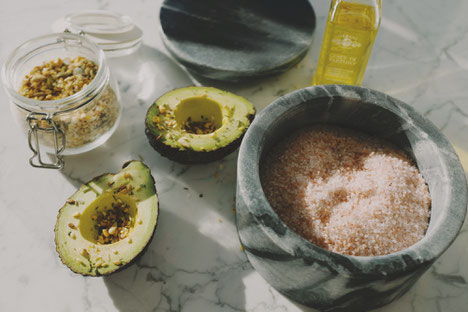
The good ones, that is. Not all fats are equal! Apart from water, your brain is mostly made up of fat. So good sources of fat are important for optimized nutrition. You should indeed get plenty of “good” fats to provide your body with flexible building material. Why flexible? Unsaturated means the chemical structure of fat is missing hydrogen molecules. At the position of those missing hydrogen molecules, the carbon molecules form a double bond, which in turn creates a bend. Due to this bended structure, the body can better store the fat and our cells (including our brain cells) become more flexible. More flexible cell walls allow for a better exchange of oxygen, vitamins, glucose etc.
You’ll find those in
- Fish (fatty fish like salmon, mackerel, sardines, herring)
- Fish oil
- Krill oil
- Olive oil
- Linseed
- Flax seeds
- Walnuts
- …
Another good source of healthy fat is olive oil. It contains lots of polyphenols, which have a similar effect like ibuprofen (not as strong) and a slightly dampening effect on the immune system. They also block the protein mTor (mammalian target of rapamycin), which is a major factor regarding longevity and prevention of disease. Butter is a neutral source of fat, neither positive nor negative. However, grass-fed butter might have positive effects due to butyrate, which is processed by beneficial gut bacteria.
Vegetable oils, which are high in omega 6, distort your omega 3 to omega 6 ratio. Omega 6 might be a precursor for pro-inflammatory processes in the body and most of us have more omega 6 than omega 3 already. Especially avoid trans fats, which are processed and “hardened”. The molecule structure of trans fats is stiff (which is why margarine is solid) and will also be stiff as building blocks in your body. When it comes to cell walls and the brain, flexible is better.
One of the most promoted source of healthy fats is the avocado. Indeed it's an awesome berry with lots of benefits. Unfortunately it also comes with a high price for the environment, as lots of water is used to grow the trees. That’s why I limit the amount of avocados in my diet.
To wrap it up, don’t be afraid of fat. It is a great source of energy and provides valuable building blocks for your body. Stick mostly with the healthy options listed above, reduce vegetable oil and eliminate trans fats from your diet. With more fat you will not experience strong cravings as much as before. You will keep a more stable energy level. If you’re uncertain if fat is right for you, consider a DNA test to verify your genetic setup. Then you can be certain how well you metabolize it.
Personally I found that with a high-fat lower carb diet, I lost a lot of weight in a very short amount of time. So if you’re aiming at weight loss, get educated about the topic.
Try to process as little as possible when cooking

Imagine our soil, once rich in nutrients for the plants, getting tilled year after year. Pesticides and artificial fertilizers are slowly sinking in, growing the hunger of the plants for more nutrients from the ground. Over time, the soil becomes depleted, which means the vegetables will in turn contain less nutrients, especially minerals and micro nutrients like folate. Once vegetables are plucked from the ground, they are cut off from their life source. From then onward, the timer is ticking and there is an expiry date on the vegetable and fruit.
Then they get transported to the supermarket and put on the shelf, where they might again sit for several days. Tick, tick, tick. You buy something, take it home and put it in the fridge for another day or two. Tick, tick, tick. By the time you take the food out of your fridge, it might have lost quite a bit of its nutrients. Imagine if you then boil it or fry it - how many more nutrients might get destroyed in the process and what are you left with?
The key message is: Try to get your food as fresh as possible. There is a reason why our grandparents needed LESS food to stay healthy. Because the broccoli, directly plugged from their own garden before cooking, still had most of its nutrients in the first place. So try to get as much of your food as unprocessed as possible. It makes sense to either by locally (e.g. from a market) or buy frozen foods, to make sure it is as fresh as possible. If you can, consume it:
1. Raw
2. Steamed
3. Cooked / Grilled / Baked / Fried
If you have to process it, try to lower the heat (under 180°C in the oven for example) or reduce the time in the pan.
Consume less dairy products

The proteins in dairy products are a source of inflammation and might cause allergies and intolerances. We are the only animal on the planet which actually consumes dairy from another species. However, some of us cannot process it very well. Some people will experience an immediate reaction to dairy products (stomach cramps, bloating, diarrhea). For others it’s more of a silent reaction, like the production of antibodies in the digestion track, known as IgG or igA (that’s what happened to me and I only found it out through a food intolerance test).
To see whether you react to milk in a certain way, eliminate it from your diet for 4 weeks. Then reintroduce it and look at how you’re feeling. Alternatively take a test to find out. Should you be sensitive to dairy products in any way, I recommend to eliminate it from your diet or at least greatly reduce your intake.
There are forms of dairy you can still eat like
- Unpasteurized raw dairy (pasteurization oxidizes the fat, creates inflammatory proteins and kills beneficial bacteria)
- Fermented dairy like yoghurt or kefir (it should come from raw milk, which is hard to come by)
- Fermented dairy in the form of cheese
Just cut down a little bit and eat less of it. Also if you just can’t forgo dairy products, stick with grass-fed options from organic sources which are full-fat.
Resources for further study (pro-dairy as well): [1], [2], [3]
Cook yourself

Becoming the cook of your own meals is very empowering and teaches you a lot about food. You decide what’s going into your meals, which means no additives and other non-food ingredients. On top of that, cooking is like meditation. You are focused on one thing and can even go into flow state. Cooking for other people is rewarding for your brain and highly social, as our brains are hardwired to share food with others. In the early days when we didn’t have refrigerators, we had to rely on getting our share from whoever was successful at hunting that day. We shared our food and others shared it with us. That’s the principle of reciprocity and the reason you can hardly accept something without giving in return. Cooking for others is therefore the ultimate social hack.
Besides all the health benefits, it makes you value your food more, keeps you from overeating and is highly impressive for the other sex.
To get inspired, I recommend the mini series "Cooked" (at the time of writing the article, available on Netflix) and looking at sites like GuatXi (German speaking) for simple, local and delicious recipes.
The most minimalistic way of cooking
Get a rice steamer. A slightly larger one. You can cook rice and at the same time steam everything else in such a pot. It takes 5 minutes to cut and prepare, 15 minutes to cook and 1 minute to season. Faster than takeaway and much cheaper, delicious and healthy.
Start cooking and you will learn for yourself what is good for your body and what is not.
Get your stuff naturally if possible
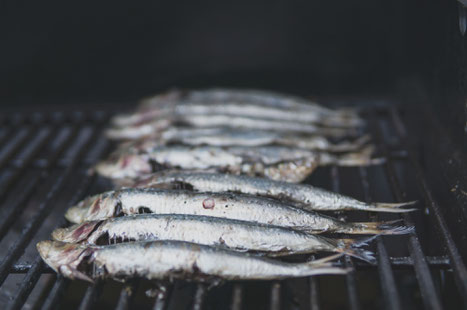
No misunderstanding: I’m a fan of supplements because they are easy to use but given the choice, I'd rather get it all from real food. Nature has designed our world over a gazillion years, creating animals and plants in a complete ecosystem. Our bodies are adapted to the natural composition of certain nutrients, as found in natural whole foods. With whole foods also come nonessential nutrients such as carotenoids, flavonoids, minerals and antioxidants, which are all highly beneficial. Whole natural foods offer a more complete nutrient package than supplements, like organ meats (basically a natural multi-vitamin and mineral), usually in a much more bioavailable version.
Even with a balanced diet, deficiencies can occur (due to higher stress levels, pregnancy, lots of sports or the depletion of soil in your region). Then the addition of supplements can makes sense.
Conclusion
To wrap this complex post up into actionable steps, let’s focus on the three major areas for optimized nutrition:
1. Get a grip on your own system by testing your DNA, blood and intolerances. Especially if you are having a goal like weight loss, muscle gain or to eliminate certain health issues. It will be the best money you ever spent. Much better than betting on false promises by wonder-shakes and supplements.
Minimalist Biohacker will support you with 15% off on all Lykon Tests.
2. Learn how to cook. Start small and simple. Prepare meals yourself and you will be in control of what goes into your body, plus it impresses the opposite sex.
3. Stick to some basic rules like:
- Less meat but better quality (and organ meat)
- More veggies
- Eliminate sugar and most processed food
- Eat more healthy fats
- Process your food less when cooking
- Eat less pasteurized dairy products
- Leave at least 3 hours in between meals and avoid snacking
This is the current status of the Minimalist Biohacker approach to nutrition. I understand there are lots of open questions and many more areas to look at. It will take more discussion, trial and error as well as experimenting to find the optimal form or nutrition, if something like that exists at all. Similar to our ecosystem, consuming any types of food will always cause a certain reaction, as well as waste products. Things that are not optimal and unwanted. For me, optimized nutrition is balanced and never extreme. It is highly individual, which is why I emphasize testing in the first place.
Don’t be afraid of this large topic though. It’s not about getting it perfect, it’s about getting a tiny bit better. Every step counts, for ourselves and the environment.
If you liked the article and got some benefit out of it, I would be grateful if you would recommend it to people who should get that info, too. You help someone you love and at the same time spread the word about optimized performance. If you're interested in daily updates on better performance, follow @minimalist_biohacker on Instagram.

Kommentar schreiben